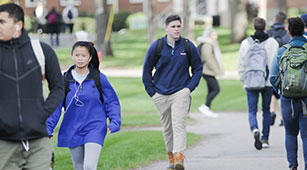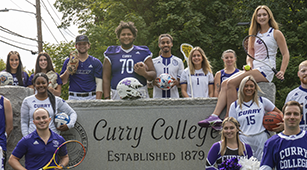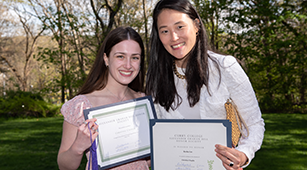Schedule an appointment to meet with Career & Experiential Learning about your area of interest.
Make an AppointmentContact International Student Services
- 617-333-2065
- international@curry.edu
- King Building, Rm. 111, Walk-in Hours: M, W: 10-11am, Th-F: 2-3pm
Passport
Your passport is an important document issued by your country of citizenship and used to establish your identity. In any correspondence with Curry College, you should use the name as it appears on your passport. If the information in your passport is not accurate, you must correct it before any other immigration documents are changed.
Validity/Expiration
Maintaining a valid passport is an important part of maintaining your immigration status in the U.S. We recommend that your passport be valid for as long as possible into the future, but at minimum, it should always be valid at least six months into the future of any anticipated entry to the U.S.
Renewal
If your passport is expiring while you are in the U.S., you will need to take the necessary steps to replace it in a timely manner. You may be able to complete this process from within the U.S. by contacting one of your country’s embassies or consulates, or by returning to your home country and renewing it there. The process for renewal will vary depending on your country of citizenship. In some cases, it may be as simple as a trip to your consulate in Boston, but in other cases it may be a more complicated and time-consuming process involving an embassy in Washington, DC, or a consulate in another city.
Corrections
Curry College will always need to use your name, as represented on your passport in the MRZ (Machine Readable Zone) on the bottom of your passport, for all of your immigration documents. If your passport name is not accurate, you must correct it before any other immigration documents are changed.
Visa
Please Note: Your I-20 is not your visa.
Your visa indicates whether you can to seek permission to enter the U.S. in a certain immigration classification. You may have more than one valid visa in your passport, but you can only have one status while you are in the U.S. Therefore, your visa only supports entry to the US and does not confirm your current visa classification or how long you can stay in the U.S.
Once you are in the U.S., be sure to keep track of your entry visa’s expiration date as it may not coincide with the dates on your other immigration documents. If you plan to travel outside the U.S., you will need a valid visa in order to re-enter. (It may be helpful to consider your visa as you would a movie ticket: You need it to get into the movie theater, but once you are in the theater, you don’t need it—unless you exit for some popcorn or snacks. Then if you want to get back in the theater, you need to present that ticket again.)
Canadian and Bermudian citizens are exempt from U.S. visa requirements and thus do not need to obtain a visa foil from a U.S. embassy or consulate before entering the U.S. However, they DO need to obtain other status-specific documents (such as a travel signature) and apply for the proper status when they pass through Customs.
Expiration & Renewal
If your visa expires while you are in the U.S., you don’t need to take any action or exit the us. Next time you depart the U.S. you will need to obtain a new, valid visa to re-enter.
You cannot get a new visa from within the U.S., so if you are leaving the US temporarily and your visa is expired, you must make arrangements to obtain a new visa at a U.S. consulate or embassy outside the U.S. before returning to the U.S.
Some limited travel abroad may be possible with an expired visa. Please review the information on automatic visa revalidation.
Visa Revocations
On rare occasion, the U.S. Department of State may decide to revoke a particular visa due to a criminal arrest or conviction. If so, they generally email the visa holder directly, but they do NOT notify the visa sponsor or the school. Only the U.S. embassy or consulate that issued your visa can confirm its status or validity. Once a visa is revoked, you must obtain a new one before re-entering the U.S. However, visa revocations usually indicate that a new visa may be challenging. You should consult an experienced immigration attorney or legal aid clinic if you visa is revoked and contact the Director of International Student Services and Global Programming.
Form I-94
What is it?
The Form I-94 is an Arrival/Departure Record issued by U.S. Customs and Border Protection (CBP) all to non-immigrant visitors entering the United States. It serves as proof of legal entry and what status you enter the U.S. in. It also indicates the permitted length of stay permitted. For F1 students it is usually valid for Duration of Status or D/S (as long as your program of study).
Where can you get it?
When entering the US a Form I-94 is electronically generated, and you can get a printout of it at https://i94.cbp.dhs.gov. You should print a copy after each entry to the U.S. If your I-94 does not reflect the correct status or entry dates please contact the Director of International Student Services and Global Programming to get information on how to correct this issue.
Form I-20
Basic information on an I-20
Your I-20 contains your biographical information. It also includes information about your degree and Major CIP code, the school's address and contact information, the program start and end date, the estimated expenses associated with your program, your financial resources, and other details including employment and practical training authorizations.
Your I-20 has a unique SEVIS ID number
The SEVIS ID number can be found at the top of the form. In general, you will keep the same SEVIS ID number throughout your program, even if you transfer your F-1 status to another school. You will get a new SEVIS ID only if you stop your studies for any reason other than medical. (This first needs to be cleared by the Director of International Student Services and Global Programming as well as your academic department)
The I-20 can be updated multiple times as your information changes
Your initial I-20 reflects your initial program information. As your academic situation changes, you may need to get an updated I-20. For example, you may need to get a new I-20 if you change your major or degree objective, or get an extension if you need more time to complete your program. You will also need to get a new I-20 if you decide to transfer from one school to another. Consequently, you may end up receiving multiple I-20s during your time as an F-1 student. We recommend that you keep all I-20 copies in your personal records.
Your Form I-20 is not a visa
You need an I-20 to apply for an F-1 student visa and enter the US as an F-1 student. However, it is not the same thing as a visa; the I-20 is produced by your school, but visas are issued only by the U.S. State Department. Note: Canadian and Bermudian citizens do not need to apply for visas, but still must have an I-20 in order to enter the US as F-1 students.
The program start and end dates are extremely important
Your I-20 reflects your expected program start date (usually the first day of classes) and program end date (usually the last day of your final semester). Understanding these dates is critical, as they determine how long you can stay in the US or when you need to do certain things, like applying for an extension. The program start and end dates reflects an estimate of the amount of time an average student in your program would need to complete the requirements for the program. See the "Program of Study" tab on this page.
The I-20 is used during travel
During your studies, and as long as you are an F-1 student, you will need to carry your I-20 and use it with your passport and F-1 visa when traveling internationally and re-entering the US. Your I-20 needs to be signed by a Curry College DSO in order to re-enter the U.S. after your initial entry to the U.S. (for your first entry to the U.S. with your initial I-20 a travel signature is not required). During your program your Travel signatures are valid for 1 year from the date signed by the DSO. If you are on OPT or STEM OPT your travel signature is valid for only 6 months. Travel signatures are valid for multiple entries.
The I-20 can be replaced
If your I-20 is lost, stolen, or damaged, contact the Director of International Student Services and Global Programming. We can issue a replacement.
Dependent I-20s
Your dependents (legal spouse or unmarried children under 21) must have their own individual I-20s. They will need to have their own I-20s to apply for and enter the US using F-2 visas.
Document Examples
I-20

Visa

I-94

Passport






